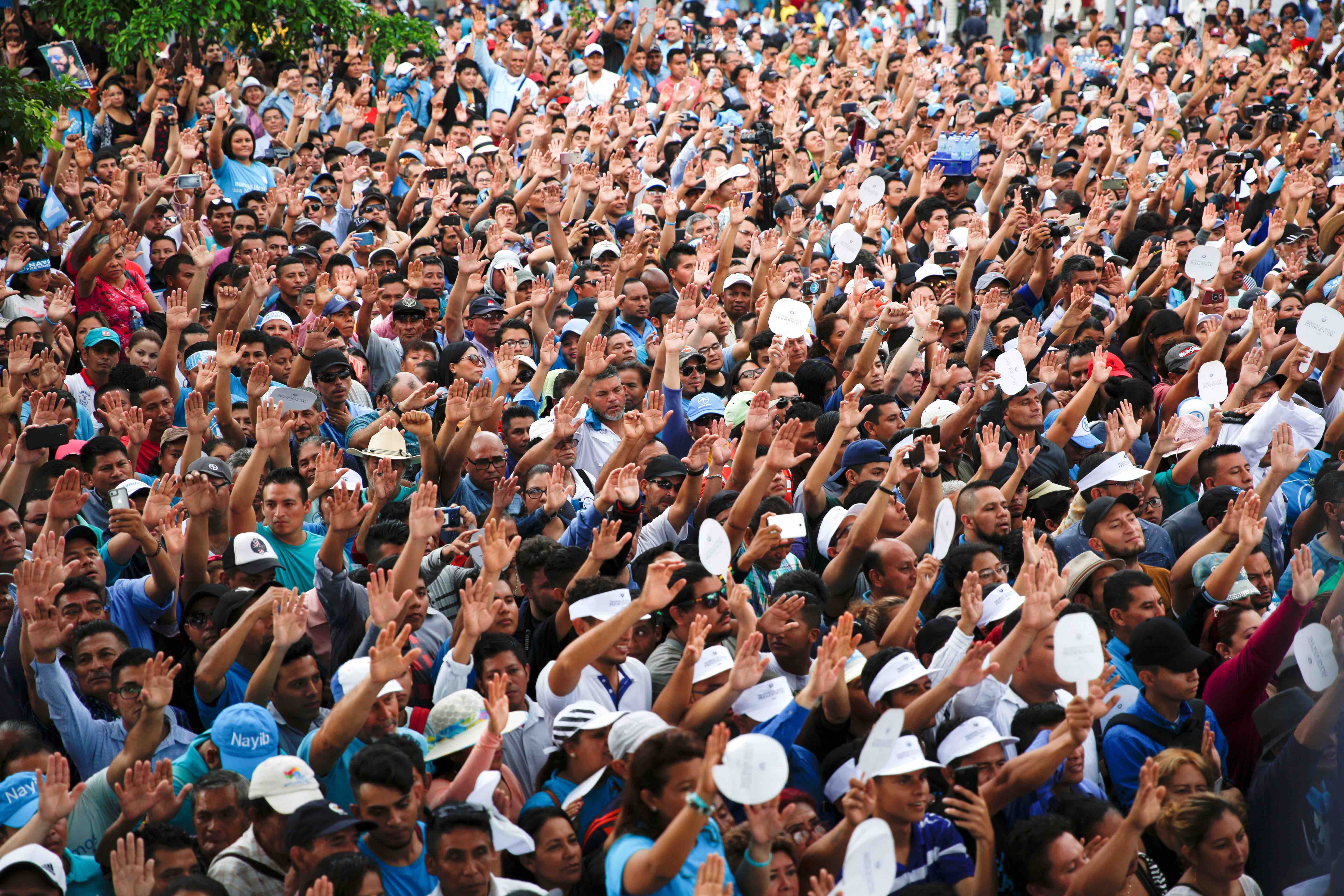On Saturday, June 1, 2019, Nayib Bukele was sworn in as El Salvador’s president. Many see the 37-year-old politician as digitally connected, young, and “hip.” Around El Salvador, Bukele represents a fresh face in a country where two corrupt parties – the right-wing party Alianza Republicana Nacionalista (ARENA) and the left-wing party formed by former guerrillas, Frente Farabundo Martí para la Liberación Nacional (FMLN) – have governed since the end of the civil war. Although he has high approval rates in El Salvador, Salvadorans in the United States are divided about him.
Bukele’s “trendy image” has spoken to some Salvis in the US because it offers a different representation of Salvadorans in the media abroad. “Here in the diaspora, folks are longing for a space in which they can feel empowered and proud of the figures that are coming out of our countries,” Samantha Pineda, Program Director at Committee in Solidarity with the People of El Salvador (CISPES), a grassroots organization working with social movements in El Salvador, tells Remezcla. Images of El Salvador in the United States often focus exclusively on gangs and homicide rates, not to mention the anti-immigrant rhetoric of President Donald Trump.
“And folks out here are very proud of their roots and seeking spaces where that identity can find a home,” Pineda adds. “I think that the image that [the media] is trying to push on who Nayib is is very much playing on this longing, this wanting to feel strengthened and empowered.”
For Porfirio Chica, a political communications expert who helped Bukele’s campaign, the diaspora played a role in Bukele’s win because they saw in him the possibility of improving the lives of immigrants in the United States. “The diaspora has Internet access and they found Nayib Bukele, then influenced families here in El Salvador,” he says.
“And folks out here are very proud of their roots and seeking spaces where that identity can find a home.”
The Government of Nayib Bukele aims to allow the Salvadoran diaspora vote for their own Salvadoran representatives abroad in the next legislative elections, according to the speech given by El Salvador’s Vice-President, Félix Ulloa, at an event with the Salvadoran diaspora in El Salvador on May 30.
Relatively speaking, not many Salvadorans voted for Bukele in February – 3,133 votes – but the number is nearly 10 times higher than the number of votes for the next most popular party, the FMLN.
For Samantha Pineda, however, the image of Bukele distracts people from his policies – she worries about his efforts to align with US foreign policy. After Bukele won the election in February 2019, he went to conservative think tank Heritage Foundation based in Washington, DC, where he called for US investments in El Salvador, for his first public appearance. Critics deplore that Bukele has yet to address President Trump’s anti-immigration rhetoric and policies. But Pineda hopes that Bukele will ensure the rights of Salvadoran refugees and immigrants in the United States are respected.

“The message of Nayib is that ‘we’re going to be friends with the United States no matter what,’” Pineda says. For CISPES, this is a dangerous route to take, especially considering the history of US diplomatic, economic, and military policies in the region, which, according to the organization, have exacerbated poverty, violence, and forced migration in El Salvador.
El Salvador and the US have a long, tricky relationship. Around a quarter of the country’s population lives in the US – many forced to move because of policies enacted by the United States – and nearly 200,000 Salvadorans could have their Temporary Protected Status canceled by the current administration. At the same time, El Salvador’s economy heavily depends on remittances sent from family members abroad and on foreign investment and trade with the United States. It’s an unequal power relation.
“I think that by talking to the conservative side, [Bukele’s] doing the right thing. You can’t help that the American government is more conservative right now,” Emory University student Amanda Obando says.
For El Salvador-born and -raised Obando, Bukele’s a symbol of hope. She believes he’s the radical change that El Salvador needs after decades of polarization between traditional parties.
“I knew that Nayib didn’t have real policy proposals, but for some reason, the cultural shift was more important than the policy,” she adds. “He was like a post-war icon. As someone growing up after the civil war, that felt very important.” Obando also sees Bukele as someone who is modern, international, and who has more access to American culture because he speaks English fluently.
“I knew that Nayib didn’t have real policy proposals, but for some reason, the cultural shift was more important than the policy.”
But this isn’t enough to win everyone over. The collective of LA-based Salvis who runs the Instagram page “Salvis Be Like” express concern of Bukele’s future foreign policy and national measures. It fears that Bukele might take away social programs put in place by the FMLN and implement austerity policies that will leave vulnerable groups like “Salvadoran workers, women, Indigenous and Afro communities, LGBTQ, and youth,” worse off, the group says.
Amanda Obando sees US-born Salvadorans as “dreamers” because they “don’t have perspective on how hard it is to grow up in El Salvador” or on how people in El Salvador are working to improve El Salvador. Obando believes that this idealism is a good thing, too, because it means that Americans fight for their liberties – yet, people in El Salvador, because they have less access to rights, are more practical. Still, she hopes Bukele will enact progressive laws for women and LGBTQ people in El Salvador.
Diego Barrera, a transmasculine Salvi living in Arkansas, also wants Bukele to allow for gender self-identification in El Salvador. Yet, he is less optimistic than Obando. Bukele has, indeed, spoken against same-sex marriage, which leaves little room to hope for more rights for trans people. He sees parallels between Bukele and Trump in their ways of communicating through Twitter and conservative policies for queer people.
“What happens in El Salvador for trans people affect us here as well,” Barrera, who founded inTRANSitive, the only trans- and immigrant-led organization in Arkansas, says. If El Salvador doesn’t relax laws for trans-people, Barrera cannot change his name and gender on his passport and driver’s license in the United States. And this creates a string of daily hassles.
“What happens in El Salvador for trans people affect us here as well.”
“Two months ago, I went to the doctor and they wouldn’t want to see me because they were like ‘your ID doesn’t match’,” he says. Every day, he needs to explain his situation for seemingly trivial activities, like changing the oil in his car, taking the plane, or going to a bar. He also says he’s at a higher risk of running into issues with the police and has a higher chance of deportation. “Whenever Mexican citizens who are trans and who are undocumented want to transition, they are able to go to a consulate and ask for a document that matches their identity, whereas I can’t do that,” he says.
“I think it’s very easy for folks to feel hopeful that things are going to change,” Barrera adds. “But he doesn’t look like the people, how can he look like the people when he’s the owner of that Yamaha company? You cannot relate to folks the same way if you haven’t had to struggle.”







